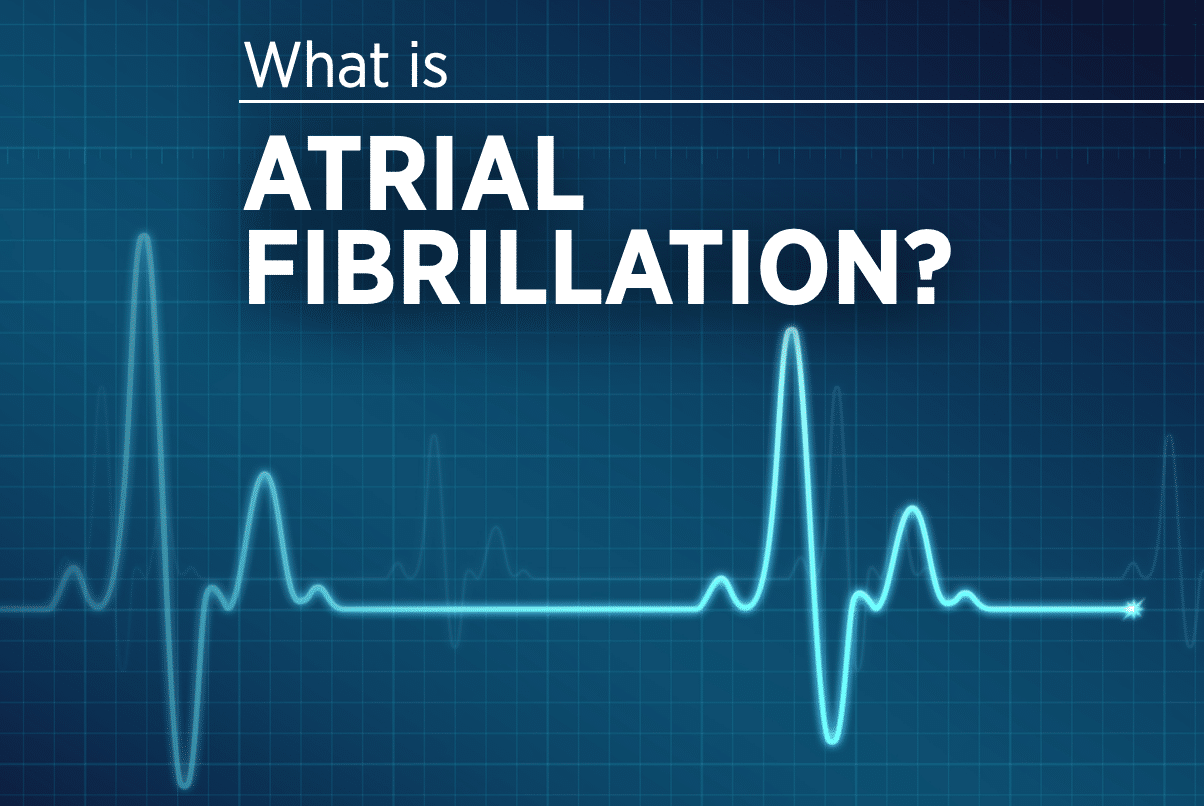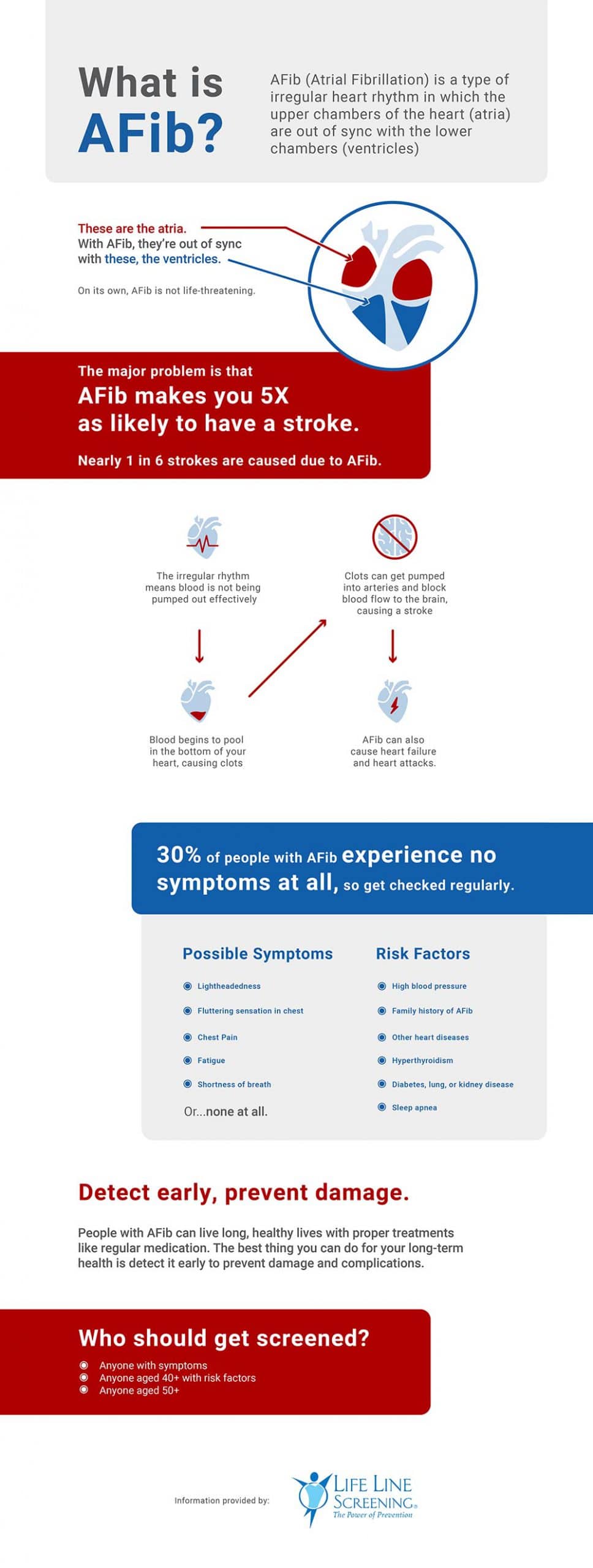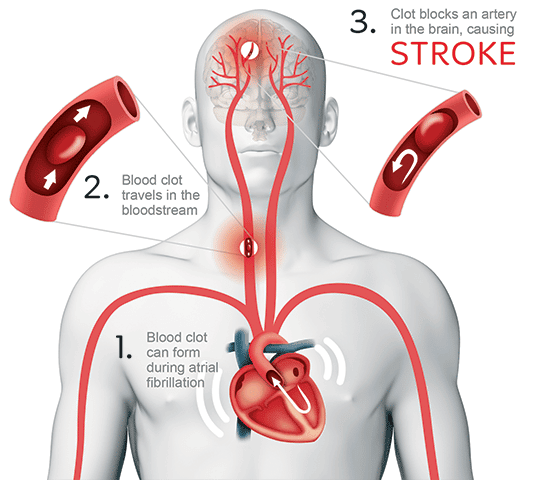
Most Popular Atrial Fibrillation articles
- Afib and Chocolate
- Afib brought on by everyday triggers
- Are Blood Thinners Overused for Irregular Heartbeat
- Implanted Defibrillators Help Women as Much as Men
- MRIs Can Be Used with Heart Devices
- Newer Blood Thinners Better for Atrial Fibrillation
- Risk for Heart Failure in Women with Afib
- The Cost Effectiveness of AFib Screenings
- Why do people develop AFib?
- What Does AFib Feel Like?
- Is it AFib or a Heart Attack?
- 7 Celebrities, Politicians and Athletes with AFib
- Atrial Fibrillation Symptoms at Night
- Anxiety and Afib: Know the Difference and Learn the Signs
- How alcohol affects people with AFib
- What is Atrial Flutter?
- How long can you live with Afib
What is AFib?
AFib, or atrial fibrillation, occurs when the heart’s chambers aren’t beating together as they should. Specifically, the heart’s two upper chambers get out of sync with the two lower ones. AFib can cause all sorts of complications including lightheadedness, shortness of breath, nausea, chest pain and even stroke. To really understand what’s happening in people with AFib, it helps to understand the basics of the cardiovascular system and how the heart works in tandem with the lungs to get your body the oxygen it needs to function.
How your heart is supposed to work
Your heart is made up of four parts: The right atrium and ventricle and the left atrium and ventricle. Oxygen-poor blood goes in the right side of your heart where it gets oxygen from the lungs and then oxygen-rich blood goes out the left side to the rest of your body. It’s pretty amazing that your body does this without you even having to think about it. This is also why your heart beats faster when you exercise since your body is using more oxygen than normal and has to work harder to keep up.
So, when everything is working as it should, your heart coordinates the pumping of its four chambers to smoothly get oxygenated blood throughout your body. But what happens when this finely-tuned machine starts losing its rhythm?
Atrial fibrillation: Heartbeats out of sync
AFib occurs specifically when the top chambers of your heart (atria) get out of sync with the bottom chambers of your heart (ventricles). In minor cases, you may experience no symptoms at all. However, as time goes on the problem can get worse if not treated properly. People who suffer from AFib have experienced all kinds of unpleasant symptoms including:
Common AFib Symptoms
- chest pain
- dizziness
- fatigue
- shortness of breath
- weakness
The biggest danger with AFib is how it contributes to your risk of stroke. If your heart can’t get blood pumped out effectively, it can pool in the bottom of your heart and create blood clots. These clots can make their way through your body and up into your carotid artery where they can block blood flow to your brain and cause a stroke. In fact, AFib patients are 5x more likely to have a stroke and almost one in every six strokes is related to AFib.
Source: Baptist Health
What AFib ISN’T
Heart health is tricky. Panic attacks, heart attacks and even general arrhythmia all have similar symptoms but very different causes and treatments. So, even if you think something is off with your heart, it’s impossible to know what it is—and treat it—without a screening.
Arrhythmia
This is a general term for when your heart beats out of rhythm. AFib is a kind of arrhythmia, but there are others too. If your heart is beating too slow, too fast or erratically, these are all kinds of arrhythmia.
Want to learn more? Visit Arrhythmia Alliance’s FAQ
Panic Attack
While they may feel the same, panic attacks originate entirely in the mind. This doesn’t make them any less scary for those experiencing them, but panic attacks are treated very differently than physical ailments like AFib.
Want to learn more? Visit the APA’s Panic Disorder FAQ
Heart Attack
While AFib causes blood to flow irregularly to the heart, a heart attack is when blood stops flowing to your heart altogether. This comes from blockages in your arteries. So, while both are very much cause for concern, one is a heart problem while the other is an artery issue.
Want to learn more? Visit The Heart Foundation’s Heart Attack FAQ
How do you know if you have AFib?
Fortunately, there is a quick and easy way to know if you have AFib or are at risk for developing it. An AFib screening, or an AFib EKG, uses noninvasive technology to make sure your heart is beating regularly. These kinds of tests are especially important because it’s estimated that between 2.7 and 6.1 million people have AFib – and many don’t even know it. Many people with AFib don’t show any symptoms at all until something drastic happens like a stroke. This is why screenings are so important.
How does an AFib test work?
AFib EKGs are among the easiest tests to perform. There are no needles or uncomfortable pressure bands and patients aren’t required to change into a hospital gown or other medical clothing. The test is conducted by attaching electrodes (small pads connected to wires) to the patient’s wrists and ankles. These electrodes are used to take readings only and don’t actually output any electricity.
Once the patient is comfortable, a trained technologist takes a reading of heart activity for about 15 minutes. Once the test is completed, results are printed out and mailed to the patient’s home address along with an explanation of everything the technician found.
One important thing to note about AFib is that the signs can come and go. Even if your results are normal, you should still go see a doctor if you are experiencing the symptoms of AFib. To be clear, you should go see a doctor if you are having chest pain of any kind, regardless of other symptoms. These could be signs of something serious and can only get worse if not diagnosed and treated.
What do I do if I have AFib?
If your results come back positive, don’t panic. Remember, there are lots of people living with AFib and aren’t even aware they have the condition. Early on, the irregular heartbeat may come and go and symptoms may be less severe. Surprisingly, 30% of those with AFib have no symptoms at all. It is completely possible to have AFib and live a full, healthy, normal life. However, even if you are experiencing no symptoms, it is very important to monitor your health situation and do what you can to improve it.
The good news is that in most cases, AFib is treatable. Like many conditions, the earlier you catch it the more your doctor can do to help. For some people, a simple prescription medication does the job of keeping it under control—blood thinning drugs can help prevent complications.
In more severe cases, a cardiologist can discuss the different procedures available.
Although significant progress has been made in determining what causes AFib, doctors still don’t completely understand why some people get it and others don’t. While nothing is definitive, there are some factors that have been shown to make certain individuals more likely to develop it. These include:
Common AFib Risk Factors
- heavy alcohol use
- history of infection
- lung diseases such as COPD
- sleep apnea
- thyroid disorders
- history of heart disease
As you can see, there is some variety in these AFib triggers, adding to the difficulty in pinning down the most likely culprit.
At the end of the day, the best thing to do if you have AFib is to have a discussion about it with your physician. With access to your full medical history and test results, they are going to be the person best equipped to help you deal with atrial fibrillation.
Are there AFib triggers?
While some people experience AFib symptoms for no reason at all, other people find that specific things tend to trigger it. If you’re living with AFib, knowing what can cause you to have an episode can be extremely helpful. These are by no means universal, just the experiences of other people with AFib.
Lack of Sleep
When you aren’t getting enough sleep it has a ripple effect on the rest of your body. Your brain doesn’t function as well as it normally does, your responses are slower, it weakens your immune system and it can cause an AFib attack. An hour or two here or there isn’t going to make a huge difference, but the effects of insufficient sleep can add up over time. Risk of an AFib attack starts to increase when people are either not consistently getting enough sleep or spend one night with severe sleep deprivation. Either situation can take a toll and trigger an AFib episode.
Travel
This one is related to the previous entry because when you travel it tends to mess up your sleep patterns. Not only that, but the hectic pace of catching flights or an all-day car trip can alter your usual diet and cause you to not drink enough water. For a healthy person, this isn’t a huge deal but for someone with AFib the additional stress on your body could be too much.
Exercise
First of all, this is not an excuse to sit on your couch all day. What it means is that if you have AFib you need to be hyper-aware of where your limits are. Don’t push yourself too hard, especially during aerobic exercise. The good news is, we live in a world that has all kinds of great technology for keeping up with your heart rate. Fitbits are especially popular, as are Apple watches, which have several health-related apps you can download.
Intake
Consider this as a catch-all term for the substances people put in their bodies that can cause harm. Especially in excess. Alcohol, caffeine, sugar, cigarettes and marijuana are all ways in which many people choose to de-stress. This is not a judgment on lifestyle choices, but all of those can also have seriously dangerous effects on those with AFib. Those with AFib should consider significantly cutting back on any of these and talk to a doctor about what the right balance looks like.
Can I prevent getting AFib?
While there is no guaranteed way to prevent getting AFib, there are methods for lowering the risk of developing it. While genetics almost certainly plays a significant role in determining risk factor, there are certain things that can be done to maintain a healthy heart.
Physical Activity
Regular physical activity has many benefits on heart health, not the least of which is reducing the risk of AFib. Just engaging in regular moderate exercise can do wonders for your heart and the cardiovascular system as a whole. The heart is a muscle and the stronger it is, the less likely it is to get off-rhythm and develop AFib, or any form of arrhythmia. Exercise has also been shown to reduce stress, which has been shown to be an AFib trigger as well.
Diet
Diet is a major factor in determining overall health, including the heart. Good, nutritious foods can be used by the body to become stronger. Those looking to strengthen their heart should look for foods that are low in salt, cholesterol, trans fat and saturated fat. Fortunately, there are lots of resources available that show how to maintain a heart-healthy diet.
Manage Your Weight
The more fat we have in our bodies, the harder our heart has to work to get blood where it needs to go. You’re also more likely to build up cholesterol plaque in your arteries, which can, in turn, increase your blood pressure. All of which increases your risk for AFib, heart attack, heart disease and stroke.
There are countless resources available to help people manage their weight. Diets, at-home workouts, and gyms are just a few of the tools people can use to get healthier. The bottom line is the best weight loss solution is the one that works for you. So do your research, find something that’s credible and get started.
The Bottom Line
First of all, understand that AFib is a serious condition. Prolonged, untreated AFib can stress the heart and increase the risk of heart failure and stroke.
If you think you may have AFib, even if you are just experiencing mild versions of AFib symptoms, it is worth it to schedule a screening. If you don’t have AFib, it’s helpful for your doctor to at least be able to cross it off the list of potential causes for why you are experiencing pain and discomfort.
Peace of Mind With Life Line Screening
At Life Line Screening, we have years of experience helping people prevent major medical issues with vital early detection services, including AFib EKGs. In fact, screenings are our specialty. We partner with community centers to help people get quick, easy access to the screenings they want to stay on top of their health. No lengthy doctor’s visits, no complicated insurance to deal with, just convenient screenings for health-conscious people conducted by trained professionals.
Schedule a Screening
Learn more or schedule a screening today at lifelinescreening.com—or give us a call at 800.718.0961. We’d love to help.

